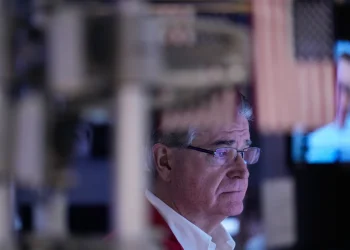Wall Street Bets on Trump’s Return, but the Market Sends Mixed Signals
Many on Wall Street, including executives, political analysts, and cryptocurrency traders, are betting on a potential return of former President Donald Trump to the White House. However, the stock market might be signaling something different.
Since August, the S&P 500 index, a key measure of U.S. stocks, has surged by over 10%. While the stock market doesn’t always reflect the overall economy, its performance leading up to elections has historically predicted the success of the incumbent party’s candidate. In the past 96 years, the S&P 500 has accurately forecasted the outcome of 20 out of 24 presidential races.
The prevailing theory is that a declining index suggests investor uncertainty about a new administration, while a rising index indicates confidence in the current party remaining in power. The recent climb in the S&P 500 could imply that Vice President Kamala Harris, who has taken over the Democratic ticket from President Joe Biden, is favored to win.
“The market is signaling a potential win for Harris,” said Adam Turnquist, chief technical strategist at LPL Financial. He noted that when investors feel more secure about the incumbent party’s chances, they become more comfortable with the policies they have implemented.
With the presidential race becoming increasingly competitive, voters are seeking clarity. This has led to increased interest in public opinion polls and betting markets, which currently lean toward Trump, alongside various indicators like sports outcomes and stock performance.
“People are naturally anxious about the election,” said Justin Grimmer, a public policy professor at Stanford University. “They look for ways to alleviate this anxiety.”
However, some experts on Wall Street are skeptical of the S&P 500’s ability to predict election outcomes. Monica Guerra, head of U.S. policy at Morgan Stanley Wealth Management, pointed out that the stock market is not a “crystal ball.” The index’s rise this year has largely been driven by gains from a few major tech companies and economic news rather than election factors. Trump himself often attributes the market’s successes to his potential return to power.
Historically, when the S&P 500 rises in the three months before an election, the incumbent party tends to win. In 2016, for example, the index fell 2.3% leading up to the election, indicating that a change in leadership was likely.
Despite its historical relevance, the S&P 500 is not infallible. In 2020, its performance suggested Trump was likely to win a second term, yet he lost to Biden. This year, many investors are still placing their bets on Trump.
Billionaire investor Stanley Druckenmiller noted on Bloomberg Television that “the inside of the market” is convinced Trump will win, citing trends in bank stocks, cryptocurrency prices, and the performance of Trump Media & Technology Group, which has seen a share price increase of over 200% since last month.
Other stocks poised to benefit from a Trump presidency are also rising. Morgan Stanley reported that a group of investment products tracking industries likely to gain from a Republican win has outperformed those aligned with Democratic interests by 10% this year.
The divided electorate and the close nature of the race contribute to conflicting indicators, Guerra explained. “This is a true toss-up,” she said.
Karoline Leavitt, the Trump campaign’s national press secretary, stated that the former president “continues to dominate in poll after poll.” She highlighted significant gains in Republican voter registration and early voting in key battleground states. “Voters know that Kamala Harris has destroyed our country, but President Trump will fix it — and that is why he is well-positioned for victory on November 5,” Leavitt said.
In contrast, spokespeople for the Harris campaign did not provide a comment.
Reena Aggarwal, a finance professor at Georgetown University, expressed skepticism regarding the stock market’s relevance today. She noted that the market no longer accurately represents the broader economy, as its gains are increasingly driven by a few large tech companies. There are also more major private companies not listed on stock exchanges.
Historically, the market was more representative of the economy, dominated by large industrial and energy firms. “There’s a disconnect between the market and the broader economy,” Aggarwal said.
Grimmer believes that while historical correlations between economic indicators and election outcomes matter, they have limitations. With voter opinions on the economy fragmented, the stock market may not be the best indicator of who will win.
“You can only rely on history so much,” he concluded. “We’ll just have to wait and see. It’s a coin flip.”
This article was rewritten by JournosNews.com based on verified reporting from trusted sources. The content has been independently reviewed, fact-checked, and edited for accuracy, neutrality, tone, and global readability in accordance with Google News and AdSense standards.
All opinions, quotes, or statements from contributors, experts, or sourced organizations do not necessarily reflect the views of JournosNews.com. JournosNews.com maintains full editorial independence from any external funders, sponsors, or organizations.
Stay informed with JournosNews.com — your trusted source for verified global reporting and in-depth analysis. Follow us on Google News, BlueSky, and X for real-time updates.













